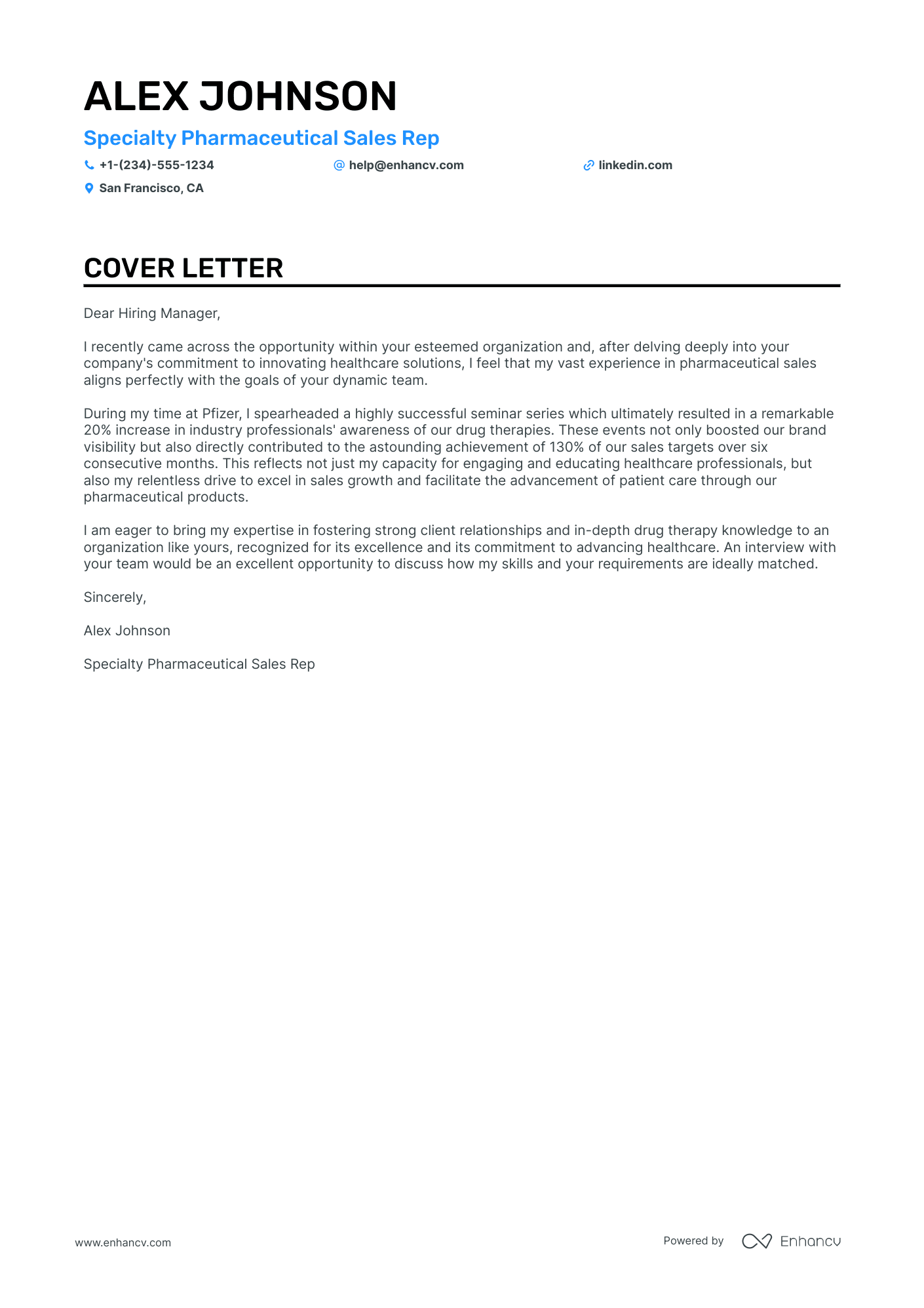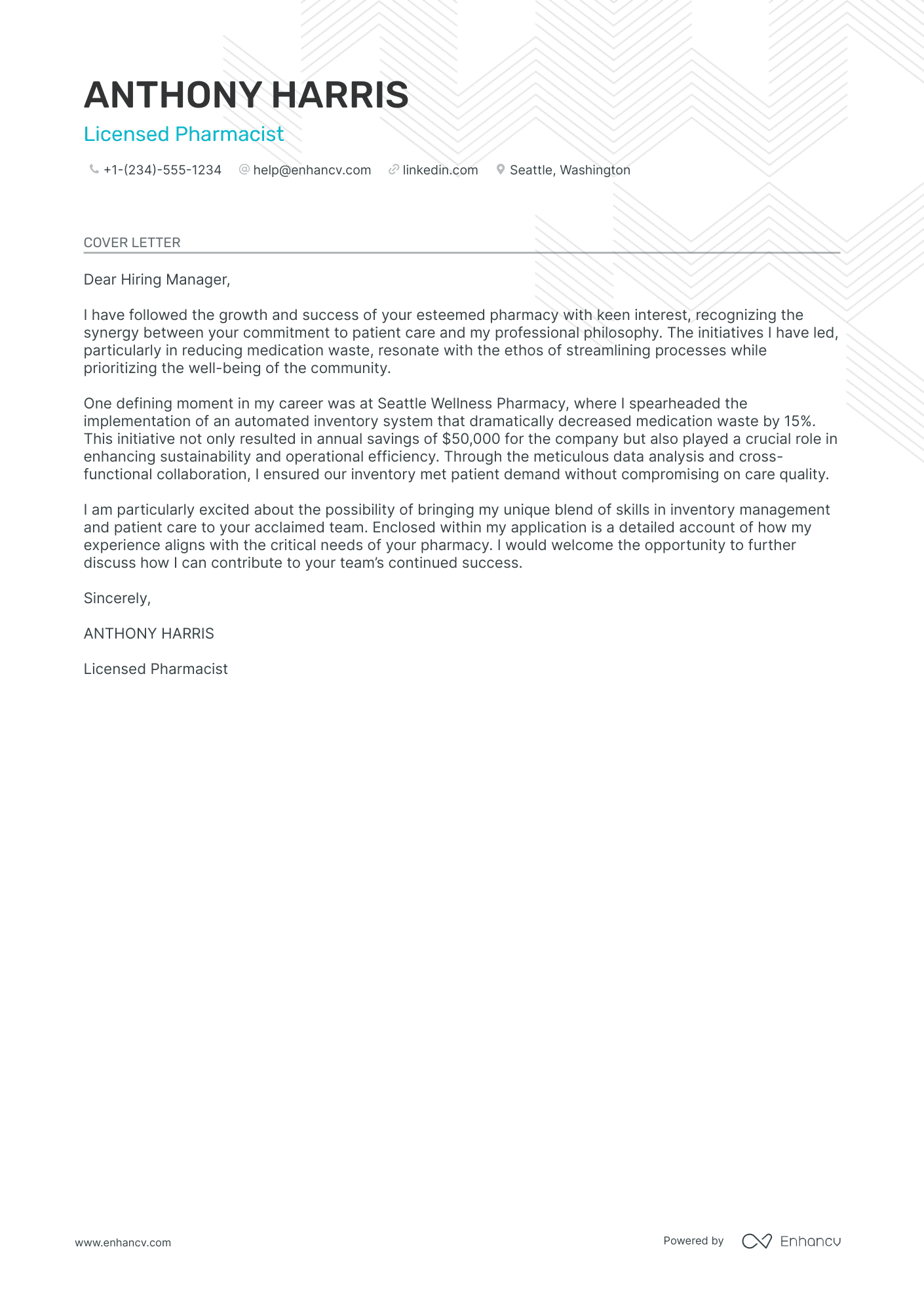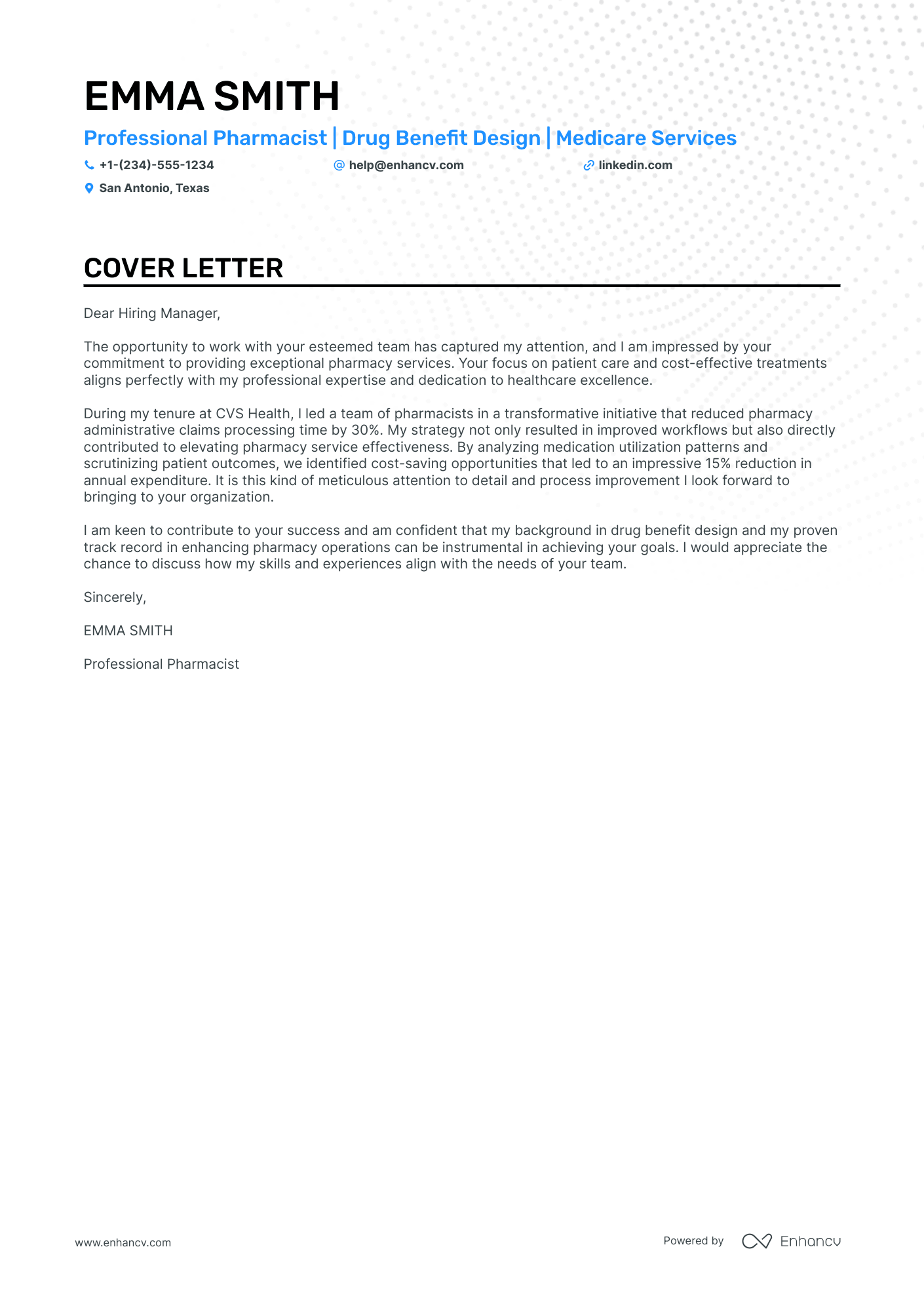Crafting a pharmacist cover letter can often feel like a daunting hurdle in your job application process. You've polished your resume and found the perfect position, only to realize the cover letter is a crucial piece of the puzzle you can't ignore. It's not about echoing your resume; it's your chance to narrate your proudest professional moment with authenticity, steering clear of tired clichés. Remember, your goal is a compelling, one-page letter that opens the door to your next career step.
- Making excellent use of job-winning real-life professional cover letters;
- Writing the first paragraphs of your pharmacist cover letter to get attention and connect with the recruiters - immediately;
- Single out your most noteworthy achievement (even if it's outside your career);
- Get a better understanding of what you must include in your pharmacist cover letter to land the job.
Let the power of Enhancv's AI work for you: create your pharmacist cover letter by uploading your resume.
If the pharmacist isn't exactly the one you're looking for we have a plethora of cover letter examples for jobs like this one:
Drop your resume here or choose a file.
PDF & DOCX only. Max 2MB file size.
Pharmacist cover letter example
Violet Rodriguez
San Diego, CA
+1-(234)-555-1234
help@enhancv.com
- Emphasizing relevant experience, such as the applicant's background in medication therapy management and process improvement, assures the hiring manager of the candidate's suitability for the Clinical Pharmacist role.
- Demonstrating impact through specific achievements, like the candidate’s leadership in a project that improved medication adherence rates by 20%, provides quantifiable evidence of their expertise and potential value to the employer.
- Showing a track record of team leadership and technological prowess, which directly relates to the goals of modern healthcare institutions, aligns the candidate's skills with the organization’s objectives.
- Making a call to action for an interview and offering availability implies proactive engagement and readiness to move forward in the hiring process.
Standard formatting for your pharmacist cover letter
Structure your pharmacist cover letter, following industry-leading advice, to include:
- Header - with your name, the role you're applying for, the date, and contact details;
- Greeting - make sure it's personalized to the organization;
- Introduction paragraph - no more than two sentences;
- Body paragraph - answering why you're the best candidate for the role;
- Closing paragraph - ending with a promise or a call to action;
- Signature - now that's optional.
Set up your pharmacist cover letter for success with our templates that are all single-spaced and have a one-inch margin all around.
Use the same font for your pharmacist cover as the one in your resume(remember to select a modern, Applicant Tracker System or ATS favorites, like Raleway, Volkhov, or Chivo instead of the worn-out Times New Roman).
Speaking of the ATS, did you know that it doesn't scan or assess your cover letter? This document is solely for the recruiters.
Our builder allows you to export your pharmacist cover letter in the best format out there: that is, PDF (this format keeps your information intact).
Need a cover letter, but short on time? Use our free cover letter generator to create one from your resume in no time.
The top sections on a pharmacist cover letter
- Header: This includes your contact information, the date, and the employer's contact information, helping the recruiter to quickly identify who you are and how to reach you.
- Greeting: Personalize your cover letter with the name of the hiring manager or recruiter, showing that you have done your homework and are sincerely interested in the position.
- Introduction: Briefly state your interest in the pharmacist position and your relevant experience, grabbing the recruiter's attention and setting the tone for why you are the ideal candidate.
- Body: Use this section to detail your qualifications, pharmacy-specific skills (like medication therapy management or understanding of pharmacokinetics), accomplishments, and any pharmacy-related experiences that align with the job requirements, proving your capability and fit for the role.
- Closing: Finish by reiterating your enthusiasm for the role, your eagerness to bring your expertise to their team, and a call to action, such as an invitation for an interview or discussion, along with a polite thank you.
Key qualities recruiters search for in a candidate’s cover letter
- In-depth knowledge of pharmacology and medication therapy management: It's crucial for pharmacists to understand drug mechanisms, interactions, side effects, and proper dosages to ensure patient safety and effective treatment.
- Strong communication and counseling skills: Pharmacists must clearly communicate complex medical information to patients and healthcare providers, and effectively counsel patients on medication adherence and lifestyle modifications.
- Attention to detail and accuracy: Precision in filling prescriptions and maintaining records is essential to avoid potentially dangerous medication errors and ensure regulatory compliance.
- Robust organizational and multitasking abilities: The ability to manage multiple tasks simultaneously, such as dispensing medication, conducting health screenings, and managing inventory, is key in a busy pharmacy setting.
- Experience with pharmaceutical software and information systems: Proficiency in using pharmacy computer systems and keeping abreast of new technologies improves efficiency and aids in medication tracking and patient record keeping.
- Empathy and patient-focused care: Exhibiting a genuine concern for patients' wellbeing and the ability to build trust is fundamental for providing personalized care and ensuring positive health outcomes.
How to greet recruiters in your pharmacist cover letter salutation
As the saying goes, "You never get a second chance to make a first impression."
Write your pharmacist cover letter salutation to be more personalized to the actual hiring manager, who is set to assess your profile by:
- greeting them on a first-name basis, if you have previously communicated with them (e.g. "Dear Sam,");
- using their last name, if you have more formal communication or haven't spoken to them (e.g. "Dear Mr. Harrows" or "Dear Ms. Marshall");
- writing "Dear HR Team" or "Dear Hiring Manager", if you have no clue about who's recruiting for the role.
Search on LinkedIn, Google, or the company website to find information as to the recruiter's name.
In any case, avoid the impersonal "Dear Sir or Madam".
List of salutations you can use
- Dear Hiring Manager,
- Dear Dr. [Last Name],
- Dear Pharmacy Director,
- Dear [First Name] [Last Name],
- Dear Hiring Committee,
- Dear [Job Title] Search Committee,
Your pharmacist cover letter intro: showing your interest in the role
On to the actual content of your pharmacist cover letter and the introductory paragraph.
The intro should be no more than two sentences long and presents you in the best light possible.
Use your pharmacist cover letter introduction to prove exactly what interests you in the role or organization. Is it the:
- Company culture;
- Growth opportunities;
- Projects and awards the team worked on/won in the past year;
- Specific technologies the department uses.
When writing your pharmacist cover letter intro, be precise and sound enthusiastic about the role.
Your introduction should hint to recruiters that you're excited about the opportunity and that you possess an array of soft skills, e.g. motivation, determination, work ethic, etc.
What comes next: your pharmacist cover letter middle paragraphs
In the next three to six paragraphs (or the body of your pharmacist cover letter) you have to prove your unique value.
Most candidates tend to mess up at this stage. They tend to just copy-paste information from their resume.
That's one big no-no.
Remember that when writing your pharmacist cover letter, it has to be personalized. And, your ultimate aim is to catch the recruiter's eye.
So, look back on key job requirements and write down a list that includes the ones you cover.
Next, select just one key achievement from your professional (or personal) history that meets those advert keywords.
Narrate a story around how you've grown your skill set and knowledge. Also, aim to show the unique understanding or soft skills you bring about, thanks to your past success.
Ending your pharmacist cover letter: a closing paragraph with a promise
If you're thinking of finishing your pharmacist cover letter with a "Sincerely yours" or "Thanks for the consideration," you need to read on.
End the final paragraph of your pharmacist cover letter with a twist:
- a promise - of how you'd grow as a professional, part of the company, or improve organizational metrics;
- a call to action - prompt interviewers with some follow-up actions if they are interested in your profile.
A personalized ending would surely help you to stand out by being a memorable candidate.
Lacking experience: here's how to write your pharmacist cover letter
As a candidate with no experience, it's important to be honest from the get-go of your application.
Use your pharmacist cover letter to sell your unique talents. Choose an accomplishment from your academic background or your volunteer work to show the skills that are relevant to the role.
Focus on your career objectives and how you see the job to align with them. Be specific and, at the same time, realistic about where you picture yourself in five years.
Key takeaways
We hope this pharmacist cover letter writing guide has shown you how to:
- Format your pharmacist cover letter with the mandatory sections (e.g. header, greeting, intro, body, and closing) and select the right font (P.S. It should be the same as the one you've used for your resume);
- Substitute your lack of professional experience with your most noteworthy achievement, outside of work, or your dreams and passions;
- Ensure recruiters have a more personalized experience by tailoring your cover letter not just to the role, but to them (e.g. writing their first/last name in the salutation, etc.);
- Introducing your biggest achievement and the skills it has taught you in your pharmacist cover letter body;
- Write no more than two sentences in your pharmacist cover letter introduction to set the right tone from the get-go.
Pharmacist cover letter examples
By Role








